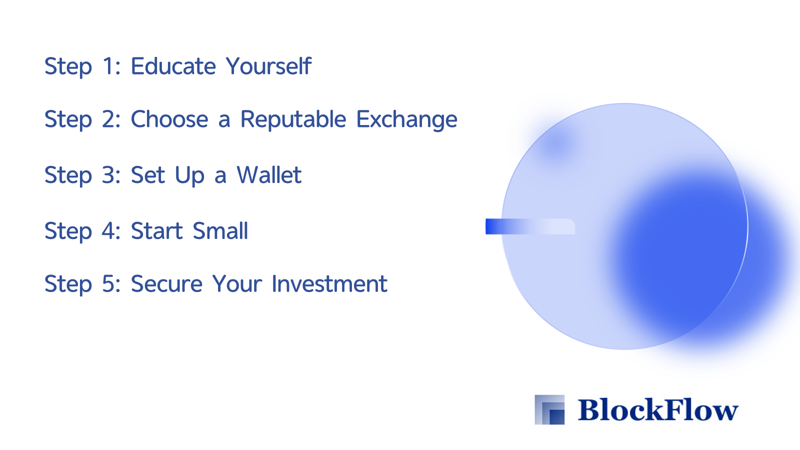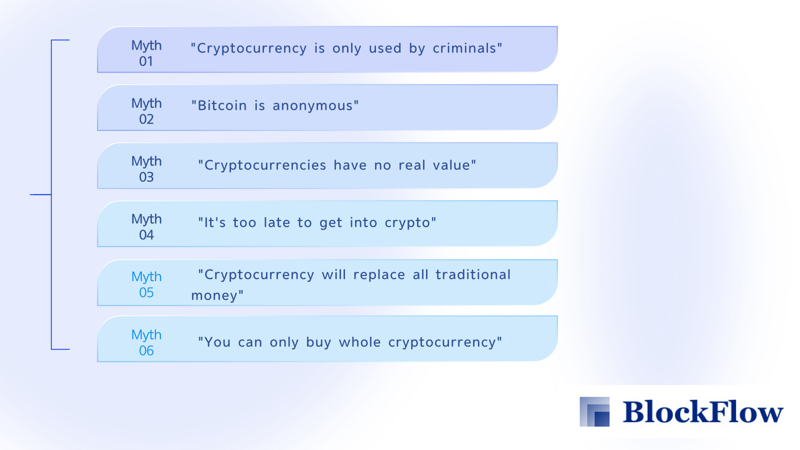Last Updated: August 27, 2025 | Reading Time: 12 minutes | Author: BlockFlow Editorial Team
📌 Quick Answer
Cryptocurrency is digital money that uses cryptography for security and operates independently of central banks. Unlike traditional currencies controlled by governments, cryptocurrencies like Bitcoin and Ethereum run on decentralized networks called blockchains, allowing peer-to-peer transactions without intermediaries.
📑 What You'll Learn in This Guide
-
How cryptocurrency actually works in simple terms
-
The key differences between crypto and traditional money
-
The most important cryptocurrencies you should know
-
Real-world uses and benefits of cryptocurrency
-
How to get started safely with cryptocurrency
-
Common myths and misconceptions debunked
What Exactly is Cryptocurrency?

Imagine sending money to someone anywhere in the world, instantly, without going through a bank, and with minimal fees. That's the promise of cryptocurrency.
At its core, cryptocurrency is a form of digital or virtual currency that uses cryptography for security. The "crypto" in cryptocurrency refers to the complex cryptographic techniques used to secure these digital assets and verify transactions.
Unlike the dollars in your bank account, which exist as digital entries in a bank's database, cryptocurrencies exist on a distributed ledger called a blockchain. This ledger is maintained by thousands of computers worldwide, making it nearly impossible to counterfeit or double-spend.
The Three Key Components
-
Digital Nature: Cryptocurrencies exist only in digital form - there are no physical coins or bills.
-
Decentralization: No single entity controls the currency; instead, it's managed by a network of users.
-
Cryptographic Security: Advanced mathematics protects transactions and controls the creation of new units.
💡 Think of it this way: If traditional money is like sending a letter through the postal service (requiring intermediaries), cryptocurrency is like sending an email directly to the recipient.
How Does Cryptocurrency Work?

Let's break down the process using Bitcoin, the first and most well-known cryptocurrency, as an example.
The Transaction Process
-
Initiation: When you send Bitcoin to someone, you broadcast a message to the network saying "I'm sending X amount of Bitcoin from my address to this other address."
-
Verification: Network participants (called nodes) verify that you actually own the Bitcoin you're trying to send.
-
Mining/Validation: Special participants called miners or validators bundle your transaction with others into a "block" and solve complex mathematical puzzles to add it to the blockchain.
-
Confirmation: Once added to the blockchain, your transaction is permanent and visible to everyone on the network.
-
Completion: The recipient now has the Bitcoin in their digital wallet.
The Blockchain: Cryptocurrency's Foundation
The blockchain is essentially a public ledger that records every transaction ever made. Think of it as a Google Spreadsheet that everyone can read but no one can edit past entries. Each "block" contains:
-
Transaction data
-
Timestamp
-
Link to the previous block
-
Unique identifier (hash)
This chain of blocks creates an unchangeable record of all transactions, providing transparency and security without need for a central authority.
Cryptocurrency vs Traditional Money: Key Differences

Top 10 Cryptocurrencies You Should Know in 2025

1. Bitcoin (BTC)
-
Market Cap: ~$2.3 trillion
-
Created: 2009
-
Purpose: Digital gold, store of value
-
Key Feature: First and most recognized cryptocurrency
2. Ethereum (ETH)
-
Market Cap: ~$470 billion
-
Created: 2015
-
Purpose: Smart contract platform
-
Key Feature: Powers DeFi and NFTs
3. Tether (USDT)
-
Market Cap: ~$120 billion
-
Created: 2014
-
Purpose: Stablecoin pegged to US Dollar
-
Key Feature: Price stability for trading
4. BNB
-
Market Cap: ~$121 billion
-
Created: 2017
-
Purpose: Binance ecosystem token
-
Key Feature: Trading fee discounts
5. Solana (SOL)
-
Market Cap: ~$83 billion
-
Created: 2020
-
Purpose: High-speed smart contracts
-
Key Feature: 65,000 transactions per second
6. XRP
-
Market Cap: ~$187 billion
-
Created: 2012
-
Purpose: Cross-border payments
-
Key Feature: Used by financial institutions
7. USDC
-
Market Cap: ~$34 billion
-
Created: 2018
-
Purpose: Regulated stablecoin
-
Key Feature: Monthly audits for transparency
8. Cardano (ADA)
-
Market Cap: ~$13 billion
-
Created: 2017
-
Purpose: Sustainable blockchain platform
-
Key Feature: Academic peer-reviewed development
9. Dogecoin (DOGE)
-
Market Cap: ~$33 billion
-
Created: 2013
-
Purpose: Originally a meme, now payment coin
-
Key Feature: Strong community support
10. TRON (TRX)
-
Market Cap: ~$30 billion
-
Created: 2017
-
Purpose: Content and entertainment platform
-
Key Feature: High throughput for dApps
⚠️ Note: Market caps are approximate as of August 2025 and change constantly.
Real-World Uses of Cryptocurrency Today
Current Applications
-
International Remittances
-
Send money across borders in minutes instead of days
-
Lower fees compared to traditional services (2-3% vs 7-10%)
-
No need for bank accounts on either end
-
Online Purchases
-
Major companies accepting crypto: Microsoft, PayPal, Tesla, Overstock
-
Growing number of small businesses worldwide
-
Gift cards and payment processors bridging the gap
-
Investment and Trading
-
24/7 markets unlike traditional stock exchanges
-
Accessible to anyone with internet
-
Various investment strategies from holding to yield farming
-
Decentralized Finance (DeFi)
-
Lending and borrowing without banks
-
Earning interest on crypto holdings (often 5-10% APY)
-
Trading on decentralized exchanges
-
Digital Art and Gaming
-
NFTs representing ownership of digital items
-
Play-to-earn gaming economies
-
Virtual real estate in metaverses
-
Store of Value
-
"Digital gold" narrative for Bitcoin
-
Hedge against inflation in some countries
-
Portfolio diversification tool
Benefits and Risks of Cryptocurrency
✅ Benefits
Financial Inclusion: 1.7 billion adults worldwide lack bank accounts but many have mobile phones, making crypto accessible.
Lower Transaction Costs: Especially beneficial for international transfers and micropayments.
Speed: Transactions settle in minutes or hours, not days.
Transparency: All transactions are recorded on public blockchains.
Control: You have full control over your funds without relying on banks.
Innovation: Enables new financial products and services not possible with traditional systems.
⚠️ Risks
Volatility: Prices can fluctuate dramatically - Bitcoin has seen 20-30% moves in a single day.
Security Responsibility: If you lose your private keys, your funds are gone forever.
Regulatory Uncertainty: Laws are still evolving and vary significantly by country.
Scams and Fraud: The space attracts bad actors due to its pseudonymous nature.
Technical Complexity: Mistakes can be costly and irreversible.
Environmental Concerns: Some cryptocurrencies (like Bitcoin) use significant energy for mining.
How to Get Started with Cryptocurrency

Step 1: Educate Yourself
-
Continue reading guides like this one
-
Follow reputable crypto news sources
-
Join community forums for discussions
-
Never invest more than you can afford to lose
Step 2: Choose a Reputable Exchange
Popular beginner-friendly options:
-
Coinbase: Best for absolute beginners (US-focused)
-
Binance: Largest selection of cryptocurrencies
-
Kraken: Strong security and customer support
Step 3: Set Up a Wallet
-
Hot Wallets: MetaMask, Trust Wallet (convenient but less secure)
-
Cold Wallets: Ledger, Trezor (most secure for long-term storage)
Step 4: Start Small
-
Begin with small amounts to learn the process
-
Consider starting with Bitcoin or Ethereum
-
Practice sending small transactions
Step 5: Secure Your Investment
-
Enable two-factor authentication
-
Never share your private keys or seed phrases
-
Consider using a hardware wallet for larger amounts
-
Keep multiple backups of important information
💡 Pro Tip: Treat cryptocurrency investment like any other investment - diversify, do your research, and never invest based on emotions or FOMO (Fear Of Missing Out).
Common Myths and Misconceptions

Myth 1: "Cryptocurrency is only used by criminals"
Reality: While crypto has been used illicitly, studies show less than 1% of cryptocurrency transactions are associated with criminal activity. Traditional banking systems actually process far more illicit funds.
Myth 2: "Bitcoin is anonymous"
Reality: Bitcoin is pseudonymous, not anonymous. All transactions are public and can potentially be traced to real identities.
Myth 3: "Cryptocurrencies have no real value"
Reality: Value comes from utility, scarcity, and what people are willing to pay. The same principles apply to gold or traditional currencies.
Myth 4: "It's too late to get into crypto"
Reality: The technology is still evolving. Current adoption is estimated at less than 5% globally, suggesting significant room for growth.
Myth 5: "Cryptocurrency will replace all traditional money"
Reality: More likely, cryptocurrencies will coexist with traditional currencies, each serving different purposes.
Myth 6: "You can only buy whole cryptocurrency"
Reality: You can buy fractions of most cryptocurrencies. You can start with as little as $10 on most exchanges.
The Future of Cryptocurrency
Emerging Trends for 2025 and Beyond
Central Bank Digital Currencies (CBDCs): Over 130 countries are exploring or developing digital versions of their national currencies.
Institutional Adoption: Major corporations adding Bitcoin to balance sheets, banks offering crypto services.
Regulatory Clarity: Clearer frameworks emerging globally, providing more certainty for users and businesses.
Layer 2 Solutions: Technologies like Lightning Network making transactions faster and cheaper.
Environmental Solutions: Shift to more energy-efficient consensus mechanisms (Ethereum moved to Proof of Stake, reducing energy use by 99.95%).
Integration with AI: Smart contracts becoming more intelligent and autonomous.
❓ Frequently Asked Questions
Is cryptocurrency legal?
Cryptocurrency legality varies by country. It's legal in most developed nations including the US, EU, UK, Japan, and Canada. However, some countries like China have banned it. Always check your local regulations.
Can cryptocurrency be hacked?
Individual wallets and exchanges can be hacked, but the major blockchain networks themselves (like Bitcoin and Ethereum) have never been successfully hacked due to their decentralized nature.
How are cryptocurrencies taxed?
In most countries, cryptocurrencies are taxed as property or capital assets. You may owe taxes on gains when you sell, trade, or use crypto for purchases. Consult a tax professional for your specific situation.
What happens if I lose my crypto wallet password?
If you lose access to your wallet (private keys or seed phrase), your funds are typically unrecoverable. This is why secure backup storage is crucial.
How many cryptocurrencies exist?
As of August 2025, there are over 20,000 different cryptocurrencies, though only a few hundred have significant adoption and use cases.
Can I mine cryptocurrency at home?
While technically possible, mining major cryptocurrencies like Bitcoin is no longer profitable for individuals due to high equipment and electricity costs. Some smaller cryptocurrencies can still be mined at home.
What's the difference between a coin and a token?
Coins (like Bitcoin, Ethereum) have their own blockchain, while tokens (like USDC, SHIB) are built on existing blockchains.
Is cryptocurrency a good investment?
Cryptocurrency can be part of a diversified portfolio, but it's high-risk and volatile. Never invest more than you can afford to lose, and always do your own research.
How do I know if a cryptocurrency project is legitimate?
Look for: clear use case, transparent team, active development, community engagement, audit reports, and realistic promises. Be wary of projects promising guaranteed returns.
Can cryptocurrency transactions be reversed?
Generally no. Once confirmed on the blockchain, transactions are permanent. This is why it's crucial to double-check addresses before sending.
🎯 Key Takeaways
✅ Cryptocurrency is digital money secured by cryptography and running on decentralized networks
✅ Bitcoin pioneered the space in 2009, but thousands of cryptocurrencies now exist for different purposes
✅ Key benefits include global accessibility, lower fees, and financial sovereignty
✅ Main risks include volatility, security responsibility, and regulatory uncertainty
✅ Start small, prioritize education, and never invest more than you can afford to lose
✅ The technology is still evolving with only ~5% global adoption, suggesting significant future potential
📚 Next Steps in Your Crypto Journey
Ready to dive deeper? Check out these related guides:
💬 Join the Conversation
Have questions about cryptocurrency? Join our community:
-
Follow @BlockFlow_News for daily updates
-
Subscribe to our newsletter for weekly insights
-
Join our Telegram group for discussions
About the Author: The BlockFlow Editorial Team consists of cryptocurrency researchers, blockchain developers, and financial journalists with many years of combined experience in digital assets. This guide is regularly updated to reflect the latest developments in the cryptocurrency space.
Disclaimer: This article is for educational purposes only and should not be considered financial advice. Always do your own research and consult with financial professionals before making investment decisions.
 PEPE0.00 5.74%
PEPE0.00 5.74%
 TON1.52 -0.22%
TON1.52 -0.22%
 BNB886.07 1.99%
BNB886.07 1.99%
 SOL124.75 2.18%
SOL124.75 2.18%
 XRP1.91 2.17%
XRP1.91 2.17%
 DOGE0.12 1.22%
DOGE0.12 1.22%
 TRX0.30 -0.34%
TRX0.30 -0.34%
 ETH2946.86 3.23%
ETH2946.86 3.23%
 BTC88737.17 1.55%
BTC88737.17 1.55%
 SUI1.45 1.10%
SUI1.45 1.10%






